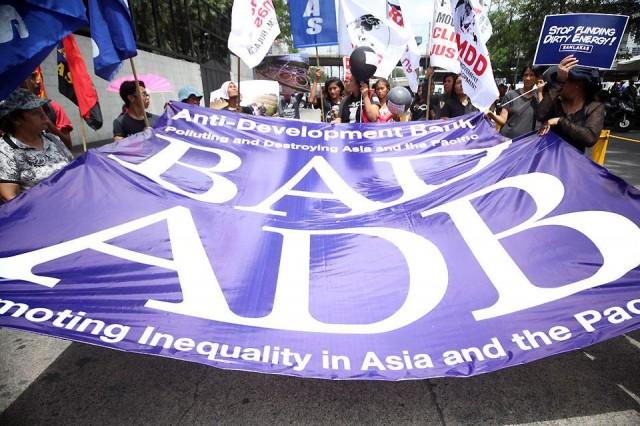ADB’s energy policies ‘anti-poor and anti-development,’ say civil society groups

Civil society organizations and groups on Thursday held a protest at the gates of the Asian Development Bank (ADB) during its 51st annual Board of Governors' meeting in Mandaluyong City, demanding that the multilateral lender stop its "anti-poor and anti-development" strategies across Asia and the Pacific.
In a statement, the groups claim that ADB's newest corporate "Strategy 2030" ensures that the private sector profits while environmental and social impact assessments are neglected.
Sanlakas secretary-general Aaron Pedrosa criticized the ADB for its alleged major role in the privatization of basic services including water and power, saying that it "falsely postured" as a partner for Asia and the Pacific.
'Dirty energy'
Pedrosa also said ADB also pushed for coal and other dirty technologies in the region.
"Due to the history of ADB’s conditionalities forcing countries to resort to the privatization of basic services, the region’s impoverished and marginalized suffer through the deterioration of the quality and accessibility of basic services and sharp increases in costs," Pedrosa said.
"Along with these harmful debt conditionalities, ADB also continues to increase the poverty and vulnerability of communities and their environment by introducing and financing dirty energy through coal projects," Pedrosa added.
Asian People’s Movement on Debt and Development coordinator Lidy Nacpil said the ADB also had a vital role in the introduction of coal-fired power plants in the Philippines through the implementation of Electric Power Industry Reform Act (EPIRA) in 2001.
"Through EPIRA, which liberalized Philippines’ power industry, the country was made vulnerable to big coal investors. Today, we have an avalanche of coal plant projects being railroaded; with ADB leading the growth of Philippines’ dirty energy through its million dollar loans for projects like the Korea Electric Power Corporation’s 200-MW coal-fired power plant in Cebu and the rehabilitation of Masinloc Power Partners Ltd.’s 600-MW coal-fired thermal power plant in Zambales province," Nacpil said.
Center for Energy, Ecology, and Development's legal and policy officer Avril De Torres also claimed the bank promotes dirty energy through its push for fossil fuel-sourced energy.
"In spite of the well-established fact that fossil fuels, especially coal, spike the risk for climate change and in spite of many countries and communities in the Asia-Pacific region standing on the frontlines of climate change impacts, the ADB still pushes for fossil fuel sourced energy more than it does for clean energy," De Torres said.
Philippine Movement for Climate Justice national coordinator Ian Rivera added that instead of remaining with its clean energy commitment of $2 billion a year, ADB funded coal projects that reached $10.735 billion from 2009-2017.
"If the ADB is truly serious in aligning with global development and climate commitments, it should explicitly aim for ending its financing and pushing for anti-development and anti-climate technologies like coal power—which only serve private interests while being of great disservice and injustice to the people," he said.
"In contrast to the anti-people and anti-environment development rhetoric rampant in ADB’s support for destructive policies on energy and other sectors, there are alternatives towards genuine development—as seen in largely untapped clean energy—which actually safeguard people’s interests through the promotion of more democratic and sustainable systems," Rivera added.
The four-day annual meeting of the ADB's Board of Governors will take place from May 3 to 6. — BM, GMA News



